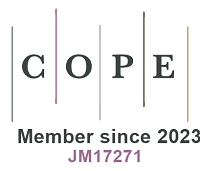REFERENCES
1. Kümmerer K, Clark JH, Zuin VG. Rethinking chemistry for a circular economy. Science 2020;367:369-70.
2. Johnson AC, Jin X, Nakada N, Sumpter JP. Learning from the past and considering the future of chemicals in the environment. Science 2020;367:384-7.
3. Kümmerer K. Sustainable chemistry: a future guiding principle. Angew Chem Int Ed Engl 2017;56:16420-1.
4. Kümmerer K, Dionysiou DD, Olsson O, Fatta-Kassinos D. A path to clean water. Science 2018;361:222-4.
6. Malaj E, von der Ohe PC, Grote M, et al. Organic chemicals jeopardize the health of freshwater ecosystems on the continental scale. Proc Natl Acad Sci U S A 2014;111:9549-54.
7. Posthuma L, de Zwart D, Dyer SD. Chemical mixtures affect freshwater species assemblages: from problems to solutions. Current Opinion in Environmental Science & Health 2019;11:78-89.
8. Groh KJ, Carvalho RN, Chipman JK, et al. Development and application of the adverse outcome pathway framework for understanding and predicting chronic toxicity: I. challenges and research needs in ecotoxicology. Chemosphere 2015;120:764-77.
9. Edwards SW, Tan YM, Villeneuve DL, Meek ME, McQueen CA. Adverse outcome pathways-organizing toxicological information to improve decision making. J Pharmacol Exp Ther 2016;356:170-81.
10. Vermeulen R, Schymanski EL, Barabási AL, Miller GW. The exposome and health: where chemistry meets biology. Science 2020;367:392-6.
11. Segner H, Schmitt-Jansen M, Sabater S. Assessing the impact of multiple stressors on aquatic biota: the receptor's side matters. Environ Sci Technol 2014;48:7690-6.
12. Birk S, Chapman D, Carvalho L, et al. Impacts of multiple stressors on freshwater biota across spatial scales and ecosystems. Nat Ecol Evol 2020;4:1060-8.
13. Sabater S, Barceló D, De Castro-Català N, et al. Shared effects of organic microcontaminants and environmental stressors on biofilms and invertebrates in impaired rivers. Environ Pollut 2016;210:303-14.
14. Rico A, Van den Brink PJ, Leitner P, Graf W, Focks A. Relative influence of chemical and non-chemical stressors on invertebrate communities: a case study in the Danube River. Sci Total Environ 2016;571:1370-82.
15. Altenburger R, Brack W, Burgess RM, et al. Future water quality monitoring: improving the balance between exposure and toxicity assessments of real-world pollutant mixtures. Environ Sci Eur 2019;31:12.
16. Daughton CG. Monitoring wastewater for assessing community health: Sewage Chemical-Information Mining (SCIM). Sci Total Environ 2018;619-620:748-64.
17. Picó Y, Barceló D. Mass spectrometry in wastewater-based epidemiology for the determination of small and large molecules as biomarkers of exposure: toward a global view of environment and human health under the COVID-19 outbreak. ACS Omega 2021;6:30865-72.
18. Barceló D. Wastewater-Based Epidemiology to monitor COVID-19 outbreak: present and future diagnostic methods to be in your radar. Case Stud Chem Environ Eng 2020;2:100042.
19. Alygizakis N, Markou AN, Rousis NI, et al. Analytical methodologies for the detection of SARS-CoV-2 in wastewater: protocols and future perspectives. Trends Analyt Chem 2021;134:116125.
20. Rice J, Kasprzyk-hordern B. A new paradigm in public health assessment: water fingerprinting for protein markers of public health using mass spectrometry. TrAC Trend Anal Chem 2019;119:115621.
21. Carrascal M, Abian J, Ginebreda A, Barceló D. Discovery of large molecules as new biomarkers in wastewater using environmental proteomics and suitable polymer probes. Sci Total Environ 2020;747:141145.
22. Griffin JH, Downard KM. Mass spectrometry analytical responses to the SARS-CoV2 coronavirus in review. Trends Analyt Chem 2021;142:116328.
23. Schymanski EL, Singer HP, Longrée P, et al. Strategies to characterize polar organic contamination in wastewater: exploring the capability of high resolution mass spectrometry. Environ Sci Technol 2014;48:1811-8.
24. Barceló D, Žonja B, Ginebreda A. Toxicity tests in wastewater and drinking water treatment processes: a complementary assessment tool to be on your radar. J Environ Chem Eng 2020;8:104262.
25. Escher BI, Stapleton HM, Schymanski EL. Tracking complex mixtures of chemicals in our changing environment. Science 2020;367:388-92.
26. Attene-Ramos MS, Miller N, Huang R, et al. The Tox21 robotic platform for the assessment of environmental chemicals--from vision to reality. Drug Discov Today 2013;18:716-23.
27. Villeneuve DL, Coady K, Escher BI, et al. High-throughput screening and environmental risk assessment: State of the science and emerging applications. Environ Toxicol Chem 2019;38:12-26.
28. Backhaus T, Faust M. Predictive environmental risk assessment of chemical mixtures: a conceptual framework. Environ Sci Technol 2012;46:2564-73.
29. Brack W, Ait-Aissa S, Burgess RM, et al. Effect-directed analysis supporting monitoring of aquatic environments--an in-depth overview. Sci Total Environ 2016;544:1073-118.
30. Prata JC, Silva ALP, Walker TR, Duarte AC, Rocha-Santos T. COVID-19 pandemic repercussions on the use and management of plastics. Environ Sci Technol 2020;54:7760-5.
31. Patrício Silva AL, Prata JC, Walker TR, et al. Increased plastic pollution due to COVID-19 pandemic: challenges and recommendations. Chem Eng J 2021;405:126683.
32. González-fernández D, Cózar A, Hanke G, et al. Floating macrolitter leaked from Europe into the ocean. Nat Sustain 2021;4:474-83.
33. Lebreton LCM, van der Zwet J, Damsteeg JW, Slat B, Andrady A, Reisser J. River plastic emissions to the world's oceans. Nat Commun 2017;8:15611.
34. MacLeod M, Arp HPH, Tekman MB, Jahnke A. The global threat from plastic pollution. Science 2021;373:61-5.
35. Eriksen M, Lebreton LC, Carson HS, et al. Plastic pollution in the world's oceans: more than 5 trillion plastic pieces weighing over 250,000 tons afloat at sea. PLoS One 2014;9:e111913.
36. Rillig MC, Kim SW, Kim TY, Waldman WR. The global plastic toxicity debt. Environ Sci Technol 2021;55:2717-9.
37. Huerta Lwanga E, Mendoza Vega J, Ku Quej V, et al. Field evidence for transfer of plastic debris along a terrestrial food chain. Sci Rep 2017;7:14071.







